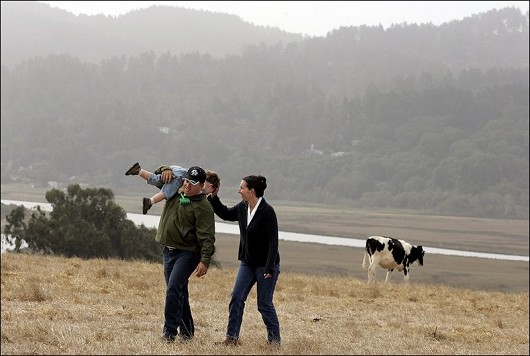Going organic
 John and Karen Taylor, with their 2-year-old son, Billy Joe, took over the Bivalve Ranch north of Point Reyes Station from Karen Taylor's mother, dairy industry leader Sharon Doughty, at the beginning of 2006. The ranch was certified organic in July.
John and Karen Taylor, with their 2-year-old son, Billy Joe, took over the Bivalve Ranch north of Point Reyes Station from Karen Taylor's mother, dairy industry leader Sharon Doughty, at the beginning of 2006. The ranch was certified organic in July.
Many North Bay dairy ranchers are turning to green methods in effort to save family farms, region's industry
Article published - Sep 18, 2006
By TIM TESCONI
THE PRESS DEMOCRAT
Karen Taylor, a former schoolteacher in Sacramento, has returned to her family's dairy ranch on the Marin Coast to live the rural dream she feared was no longer possible.
Taylor, 33, and husband John Taylor, 36, are among the growing number of Sonoma-Marin dairy farmers going green to save the family farm. Ranchers are giving up using antibiotics, pesticides and herbicides to produce organic milk - milk worth twice as much as conventional milk and a trend that could prove the salvation of the region's $120 million dairy industry.
The high prices are being driven by consumers who perceive organic milk as safer and healthier. Dairy farmers, determined to keep their land, cows and way of life, are lining up to fill the organic pipeline.
"The only way it works economically for us to come back home and run the family dairy is to go organic," said Taylor, a sixth-generation rancher who yearned to raise her two children on the 780-acre Point Reyes Station dairy where she grew up. Taylor is the daughter of Sharon Doughty, a longtime rancher and dairy industry leader who is retiring.
"By taking our herd organic we can make more money with fewer cows and reduce the number of employees, which means less stress on us and the land," said Taylor, the mother of Camilla, 5, and Billy Joe, 2.
The Taylors are among more than 20 of the 90 dairy ranchers in Sonoma and Marin counties who have made the transition to organic milk production or are in the process of earning organic certification. Many more North Coast dairies are considering making the switch as prices for conventional milk stay low because of a national surplus.
The numbers tell the story.
Producers selling organic milk to Clover Stornetta Farms get $24 a hundredweight, the unit by which milk is sold from the farm. Conventional milk is bringing about $12 a hundredweight.
There are higher costs in producing organic milk but ranchers said production costs are not double.
"Producing organic milk is a way we can be profitable. We just can't take these huge drops in the price of conventional milk. Right now I'm probably losing $4,000 to $5,000 a month," said Doug Beretta, who is making the transition to organic milk production on his family's Santa Rosa dairy farm. His herd and his family's 400-acre ranch will be organically certified in April.
"I only wish I had made the move to organic milk sooner," said Beretta. Like other ranchers, he worries about the long-term market for organic milk as more and more producers make the transition.
The North Coast is ideal for organic milk production because the cow herds are smaller than the California average and there's an abundance of pastureland for grazing. Providing cows access to pasture is one of the federal requirements for producing organic milk.
"Organic milk is the next viable niche for Sonoma-Marin dairies and a way for this historic industry to survive. A good 75 percent of the dairy ranchers in the two counties are investigating the organic option," said Dayna Ghirardelli, a dairy program specialist with the UC Cooperative Extension in Sonoma County.
Ghirardelli knows firsthand about taking a dairy through the organic certification process. As a member of the Wilson dairy family she handled the paperwork required to get organic certification for her family's Diamond W Ranch in Petaluma.
While the market for conventional milk remains flat, sales of Clover Stornetta Farm's organic milk are growing 25 percent a year, said Marcus Benedetti, president of the Petaluma-based milk processor.
Clover Stornetta already buys organic milk from nine dairy ranches in Sonoma, Marin and Mendocino counties. Another eight dairies are moving into organic production to help Clover Stornetta meet the demand for its line of organic milk distributed to retailers like Whole Foods.
"Our boss is the consumer and consumers are driving the demand for organic milk," said Benedetti.
At the Whole Foods store in Santa Rosa, a half-gallon of Clover's organic milk is $3.49, compared to $2.05 for regular milk.
Clover Stornetta Farms and Straus Family Creamery in Marshall, Marin County, are the leading buyers of organic milk from Sonoma-Marin dairies. Both milk processors earn high marks for their producers' adherence to organic principles.
The Cornucopia Institute, a Wisconsin-based organization that exposes organic farming abuses, rates Clover Stornetta and Straus as "excellent" in terms of organic integrity.
Mark Kastel, farm policy analyst for the Cornucopia Institute, said smaller, family farms like those in Sonoma and Marin counties are following the USDA's regulatory standards for organic milk production.
But it's not the same everywhere, said Kastel. Investigations by his organization have found that some industrial-scale dairies in the West, ranches with 2,000 to 10,000 cows, are producing milk in feedlot conditions without adequately grazing their cattle.
"There are a handful of bad actors looking for loopholes," said Kastel.
Dairy farms producing organic milk are monitored by organic certifiers and randomly audited to make sure they are buying organic grain and hay and following other regulations to ensure the purity of the milk.
"The integrity of the dairy rancher is what's going to keep consumers buying organic milk," said Beretta, who is being certified by the California Certified Organic Farmers, based in Santa Cruz.
"The organic plan for my dairy was 30 pages," Beretta said.
In addition to bottling the organic milk from his own cows, Albert Straus buys milk from the Wilson family's Diamond W Dairy and from dairy farmers Kathy and Joe Tresch of Petaluma. Straus said a third Sonoma County dairy will soon be producing organic milk for the Straus label.
"We're steadily growing but growing in a way that won't swamp the market," said Straus, a pioneer in organic milk production. In 1994, Straus established the first organic dairy west of Wisconsin, leading the way for other North Coast dairy farmers.
Three years ago Petaluma dairy rancher George McClelland and his daughter, Jana McClelland, started producing organic milk for Clover Stornetta Farms. Each year they convert more and more of the herd to organic production. Today there are 520 cows in the organic herd and 460 cows in the conventional herd. They plan to be completely organic one day.
"It's a different mind-set. You don't have the convenience of using drugs and are always looking at organic treatments for the cows," George McClelland said. "Now we look at things like garlic to treat sick cows."
McClelland believes his conventional milk is pure and healthy, too. But as a businessman, he must produce what consumers want to buy.
Lex McCorvey, executive director of the Sonoma County Farm Bureau, said the problem with the organic movement is that it suggests organic farmers are the only ones who take care of their animals and land by following a purist set of management and husbandry practices.
"Every producer and grower has a responsibility to produce and provide the most wholesome and nutritious food possible," said McCorvey.



